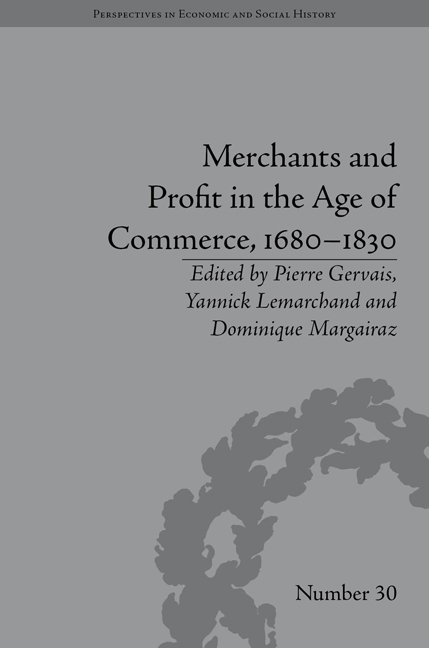Book contents
- Frontmatter
- CONTENTS
- Acknowledgements
- List of Contributors
- List of Figures and Tables
- Introduction: The Many Scales of Merchant Profit: Accounting for Norms, Practices and Results in the Age of Commerce
- Part I Understanding Merchant Transactions
- Part II The Credit Nexus and its Pitfalls
- 3 Terms of Payment in Retailing: A Tool for Fostering Customer Loyalty or a Form of Managerial Constraint? A Few Observations Based on Accounting from Lorraine in the Eighteenth Century
- 4 The Wings of a Butterfly: Private Creditor Strategies in the ‘Chinese Debts’ Crisis of 1779–80
- Part III Beyond Price Signals: The Institutional Framework
- Part IV Diversification and Risk Management
- Conclusion: Reorienting Early Modern Economic History: Merchant Economy, Merchant Capitalism and the Age of Commerce
- Notes
- Index
4 - The Wings of a Butterfly: Private Creditor Strategies in the ‘Chinese Debts’ Crisis of 1779–80
from Part II - The Credit Nexus and its Pitfalls
- Frontmatter
- CONTENTS
- Acknowledgements
- List of Contributors
- List of Figures and Tables
- Introduction: The Many Scales of Merchant Profit: Accounting for Norms, Practices and Results in the Age of Commerce
- Part I Understanding Merchant Transactions
- Part II The Credit Nexus and its Pitfalls
- 3 Terms of Payment in Retailing: A Tool for Fostering Customer Loyalty or a Form of Managerial Constraint? A Few Observations Based on Accounting from Lorraine in the Eighteenth Century
- 4 The Wings of a Butterfly: Private Creditor Strategies in the ‘Chinese Debts’ Crisis of 1779–80
- Part III Beyond Price Signals: The Institutional Framework
- Part IV Diversification and Risk Management
- Conclusion: Reorienting Early Modern Economic History: Merchant Economy, Merchant Capitalism and the Age of Commerce
- Notes
- Index
Summary
A debt crisis exploded on the China coast in the late 1770s. Groups of private creditors, notably British and French citizens, sought to collect over $5million which they claimed was owed to them by Chinese hong merchants. This chapter examines these claims, the creditor groups and the strategies that were employed to recover monies advanced to Chinese citizens. French and other foreign creditors received nothing. British creditors collected a fraction of their claims, which was paid without interest over ten years. This episode caused the Chinese government to modify the rules governing the Canton System leading to their final or mature form.
The issues involved in this crisis, and the regulatory response to claims of foreign creditors seeking the payment of principal and interest alike, are all familiar today. As with the flap of the wings of an imagined butterfly, consequences of the demands for payment in full of 1779–80 were felt across the globe. One idea produced by this debt crisis, carried from China to the United States, evolved and transported across the globe, is now a fundamental of banking regulation worldwide.
Introduction
The crisis of 1779–80 arose from loans that had been made by private European lenders to Chinese merchants over approximately the fifteen preceding years. The crisis arose in Canton, the locus of a burgeoning trade that was both confined to that port and closely regulated by the Qing government.
- Type
- Chapter
- Information
- Merchants and Profit in the Age of Commerce, 1680–1830 , pp. 75 - 94Publisher: Pickering & ChattoFirst published in: 2014



